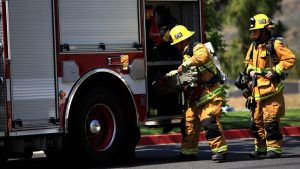One year after a worker was killed in a trench collapse, charges have been laid against those overseeing work on the Edmonton, Alta. home.
According to Alberta Occupational Health and Safety, on April 28, 2015, a 55-year-old man was employed as a labourer for a landscaping company that was connecting a new sewer line from the City of Edmonton’s drainage line to a residential home under construction. The only other worker doing work on the sewer line was the excavator operator. While in the freshly dug, three-metre-deep trench, the south wall of the trench collapsed, trapping the 55-year-old labourer and fatally injuring him.
His remains were recovered early the next morning by emergency crews.
Alberta Occupational Health and Safety spokesperson Danielle Boucher said the man worked for a temporary labour agency retained by Sahib Contracting Inc.
Haya Homes Ltd., Sahib Contracting Inc. and Sahib supervisor Sukhwinder Nagra now all face charges under the Occupational Health and Safety Act and are due in court Nov. 2.
Haya Homes Ltd. has been charged with six counts, including: failure to ensure that the Occupational Health and Safety Act, the regulations and the adopted Code were complied; failing to establish or maintain a system to ensure that Sahib Contracting Inc. complied with the section that requires an employer to stabilize the soil in an excavation, tunnel, underground shaft or open mine pit; and failure to ensure, as far as reasonably practicable, that Sahib Contracting Inc. was competent to excavate.
Sahib Contracting Inc. has been charged with seven counts, including: failure to ensure the health and safety of a worker; failure to ensure that if work is to be done that may endanger a worker that the work is done by a competent worker; failure to assess the work site and identify existing or potential hazards before work began at the work site; failure to stabilize the soil in an excavation by shoring or cutting back; failure to provide workers with a safe means of entering and leaving an excavation; failure to ensure a worker did not enter an excavation site that wasn’t properly piled; and failure to ensure that the spoil pile for an excavation was piled so that the leading edge was at least one metre away from the edge of the excavation.
Nagra has been charged with eight counts, including: failure to take reasonable care to protect the health and safety of another worker present while he was working; performing work that may endanger the worker or others when he was not competent to perform that work; failure to ensure the health and safety of a worker engaged in the work of that employer; failure to assess a worksite and identify existing or potential hazards before work began; failure to stabilize the soil in an excavation by shoring or cutting back; failure to provide workers with a safe means of entering and leaving an excavation; failure to ensure a worker did not enter an excavation site that wasn’t properly piled; and failure to ensure that the spoil pile for an excavation was piled so that the leading edge was at least one metre away from the edge of the excavation.
Dan MacLennan, executive director for the Alberta Construction Safety Association, said the case is a reminder that training and education are of the utmost importance, especially those who are new to the Canadian workforce.
"Whenever you see a situation like this, it’s horrible," MacLennan said. "Some families lost a family member and they can’t get that back."
MacLennan said it appears in this case the victim may have been from a more vulnerable part of the workforce, highlighting the need to educate workers on their right to refuse dangerous work and the responsibility of employers to provide safe working conditions.
"The right to refuse dangerous work sounds good, but unless we teach and encourage people to do that, to me it’s not really a right at all," MacLennan said. "We want to make sure people know their rights."
In addition to various safety and communications courses, MacLennan said the association is working to address safety education by brainstorming with government officials.











Recent Comments
comments for this post are closed